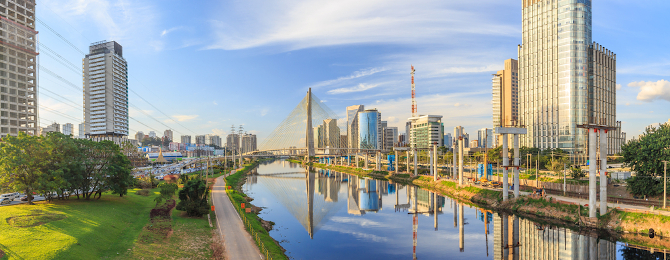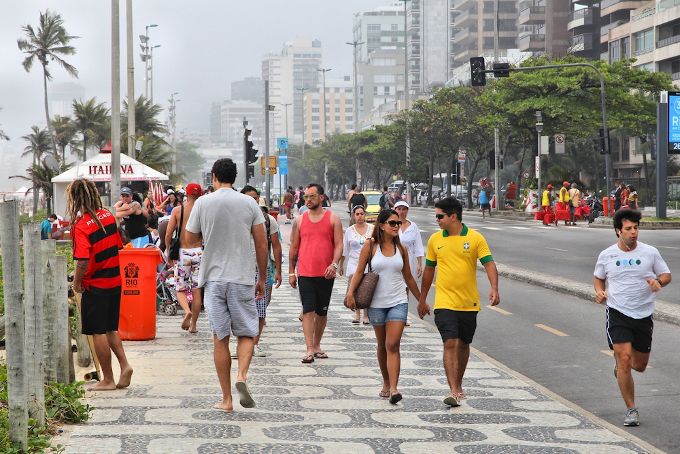Best Ways to Disappear on a Brazilian Beach

The title of this travel article is inspired by Brazilian writer Indra Novey’s 2016 charming novel, Ways to Disappear. Of course, I am not suggesting that you literally disappear on a Brazilian beach. But you should let the dog out and forget that you have a return flight.
Four o’clock in the afternoon may be called Miller Time or Happy Hour here in the U.S, but in the $50-per-night Rio de Janeiro hotel where I was staying, guests knew it was Caipirinha time. From my surprisingly roomy second-floor balcony overlooking the affluent and SoHo-like Ipanema neighborhood, I could almost see the beach two blocks away, through the heavy foliage of a gigantic magnolia tree.
I could also hear the old-fashioned school bell they rang to signal that caipirinha was ready to drink now. Caipirinha is the kind of libation you drink once out of cultural politeness. It’s a fast way to overdose on sugar and lime, before you get a buzz from the cachaca in it. Fortunately, Brazil has so much more to offer than caipirinha.

I could hear the bell easily because Brazilians have a penchant to enjoy life in the open. Doors and windows are often ajar. And Brazilians – good-looking people – never hesitate to get physically intimate in public. Other than tourists like me, nobody even stares.
Pretty soon you will be embarrassed for looking at other people enjoying their lives. You are supposed to lose your self-consciousness and participate. Think of carnivals. Think of samba. Think of forro (a Brazilian dance very similar to jitterbug or West Coast swing.)
Nobody is an audience. Everybody is an actor. This simple yet compelling ethos is also reflected in Brazilian democracy. The Constitution dictates that voting is mandatory for anyone aged 18 through 80. What if you don’t wish to vote, just like how one-third of American voters felt about the 2016 election? Well, be my guest. But you would face a fine and will be disqualified from any federal government jobs. In other words, you have to live 80 years to earn the privilege of choosing not to participate in an election.
And when all guests participated in the hydration game of caipirinha served from a giant glass bowl – or is that actually a goldfish tank? – the collective mood of the crowd soon elevated. As a passionate Brazilian beat blasted from a cheap boombox that looked like a 1980s relic, the hot-blooded Brazilians started dancing forro, in their casual attires. As an American, I instantly gave myself several excuses not to participate. The vinyl floor produced an unpleasant squeaky sound. A barefooted guy was perspiring profusely, and I suspected that he was producing a kind of odorous mist in the air. Nobody spoke English. Nobody realized that one actually had to learn the move.

The Brazilian soul is an utterly healthy one. Society is a giant village. When the music starts, every villager moves and nobody has time to judge others. In her immortal novel, The Hour of the Star, Clarice Lispecter created a character named Macabéa, a young girl from northeastern Brazil. Unlike most of us, Macabéa is incapable of finding reasons in life to be unhappy. Such character traits are so extraordinary and inspiring. Shame on the rest of us. We usually can't feel happy without smoking weed or popping a few pills of benzodiazepine.
Tolstoy once said, “Happy families are all alike; every unhappy family is unhappy in its own way.” If I may paraphrase, I would say every Brazilian finds their own reason to be happy, almost unconditionally. In fact, Brazilians cannot stop feeling that they are so blessed and it is only fitting to display their happiness. “God is Brazilian” is a quote I heard from many people I met in Brazil. And I agree with them that God favors Brazil, a coastal country that has never experienced a tornado, typhoon, or a tsunami.
I can go on and on. But I think it’s time for me to provide details about how easy it is to enjoy yourself in Brazil as a tourist.
Money is not an issue. In Brazil, you can easily find six packs of Heineken selling for roughly $1. I stayed in Ipanema for a week and I dined almost exclusively in Michelin Bib Gourmand restaurants. I once got an elaborate octopus caprese for $5 and an entree of hand-made pasta with puttanesca for $8.
Uber rides are also dirt cheap. I was never able to break the $5 ceiling no matter where I went. Not to mention public transportation. A long-distance bus ride from Rio de Janeiro to Sao Paulo costs barely $3.

Every cup of Joe is gourmet grade in Brazil, no matter how humble a place you get it from. One of my pet peeves when I travel domestically in the U.S. is the undrinkable morning coffee you get from the motel buffet. No such worries in Brazil.
Watch out for your sugar intake. On the streets of Rio and São Paulo, you will see handcarts with glass cabinets filled with cakes, pastries and other kinds of dessert. It strikes me that Brazilians don’t really see serious desserts as an after-dinner fare. They eat it at any random time of the day, as snacks. Not to mention the countless tropical fruits I can barely name.
I read somewhere an economist posited that in Brazil, poverty never means hunger because the cheapest calories come in the form of succulent tropical fruits. And a coconut generally costs much less than a can of Coke. And Brazilian coconuts are superior.

Learn to get along with Cariocas and Pualistas differently. People who are born or live in Rio de Janeiro are nicknamed Cariocas, while those in São Paulo as Paulistas. The difference between them goes way beyond what teams they cheer for in a soccer game.
Cariocas are outright friendly and chatty. You could hardly walk through a hotel lobby or a city block without exchanging Brazilian pleasantries like “Todo bem?” and “Esto bem, obrigado.”
Paulistas, on the other hand, are more guarded and could be borderline cold. Many Cariocas do not like Paulistas for that very reason. Throughout my three weeks stay in Brazil, there was only once a stranger and I did not exchange any verbal greetings. It was in an elevator of a hotel in São Paulo.
Mind your language. The first day I tried to speak Portuguese after I landed in Rio, I was shocked to hear a woman say “Obrigado!” to me. Going by textbook, she should have said “Obrigada!” It is a tricky thing as Portuguese words have gender assignment. When in doubt, hide in English and do not assume anything.

Life is slow-paced. This generally is not a problem for a tourist as you are there to relax. But do not expect to get things done quickly. I left a box of chocolate at a hotel front-desk for someone to pick up. Long story short, my request was never fulfilled. The first person called the recipient and discovered the phone number I provided was not working. The box was just left there. Nobody bothered to tell me. Nor did the clerk who called the recipient bothered to inform his colleagues.
Don’t cause a plumbing accident. Brazil has, unfortunately, inferior sewage system. You can see a sign in public or hotel bathrooms that remind you not to flush down toilet paper. You must fold after you wipe and dispose of the limp origami in a garbage bin. It’s unpleasant and takes getting used to. But I was warned that accidents could happen if I broke the rule.
I obeyed the sign and never tested to find out how good or bad the plumbing really is.

Most Brazilians are extremely honest. I traveled there with a new iPhone and went to the local carrier store to buy a local SIM card to save money. The card was activated and I walked out of the store. The cellular signal disappeared. I went back to the store and the manager came along and immediately realized it was the common case of American carriers locking the Smartphone they sold as part of their mobile plan. Before I even asked, the store gave me a full refund and polite apology.
I also made the fatal mistake of dropping my passport when running to a bus terminal. A Brazilian youngster chased me down and handed me the passport.
Be alert about safety, but no need for paranoia. Safety tips are the most common tips you would receive when you travel to Brazil. Some of them are valid: Don’t stand on a street sidewalk and play with your fancy smartphone; don’t bring your fat wallet to the beach and leave it on your beach towel. Some of them are not valid but worth obeying: Don’t go into a favela or certain rough neighborhood alone. I did it alone and never felt threatened. But I understand where such advice comes from.
After hearing stories of street killings and gunfight between drug cartels and police, I was paranoid about safety at first. I wore a pair of sneakers with steel-toe tips and metal-spiked soles. I also got a backpack from Amazon that can be weaponized easily in an emergency.
In the end, those things basically served the purpose of some kind of insurance. I never needed to use them.
I did have a young man following me once on the street of Ipanema. He had an inquisitive look on his face and his eyes moved way too quickly for me to feel safe. I tensed up when he got really close behind me.
“What are you looking for?” the man said in halting English, “Can I help you?”
I told him I was having trouble locating a laundromat that Google maps kept rerouting me to. The man walked with me for three blocks and pointed out the place to me. I believe I passed it three times in my search but it had a different name than signified in Google search.
And that brings me to the final point of this travel guide and it has to do with a well-known quote from a Brazilian classic Dom Casmurro —

Quem tem boca vai a Roma. It is the equivalent of every road leading to Rome, but with a critical twist. The verbatim translation of it into English would be: “He who opens his mouth and asks for directions reaches the destination of Rome.”
Life in Brazil is not as impersonal and digital as in U.S. Words of mouth tend to provide better information than Google searches. One of my bucket-list items was to try some authentic feijoada, a stew with all kinds of animal offal and beans. For some reason, most restaurants do not serve such humble comfort food.
So I asked around. It turned out gas stations have hot buffets and one can normally find good feijoada there. Brazilian buses have mandatory lunch stops at gas stations. The stop can be as long as 40 minutes because by law, bus companies must provide their drivers lunch breaks.
And on my bus trips between Rio de Janeiro, São Paulo, and Arrail du Cabo, I feasted on feijoada to my heart’s content.
Author Bio:
Peter Chang is a pseudonym of a contributing writer at Highbrow Magazine.
For Highbrow Magazine
Photo Credits: Depositphotos.com































































































































































































































































































































